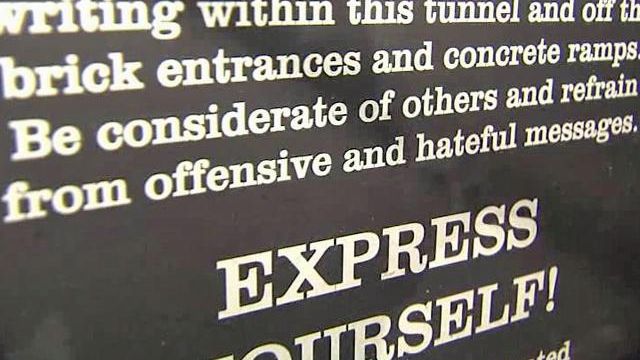Students protest slurs in N.C. State's Free Expression Tunnel
Students have vowed to protest or block North Carolina State University's Free Expression Tunnel until the university's chancellor gives guarantees that no hate speech will be allowed there.
Posted — UpdatedAbout 40 students painted the tunnel black overnight to protest racist and homophobic graffiti involving President Barack Obama painted there Sunday night. Slurs and the name "Obama" were painted over the picture of a black man.
"It's not about the N-word. It's not about Obama. It's about racism, period," N.C. State sophomore Monique Bonds said.
The protesters also stood locked arm-in-arm, sang and prevented anyone from passing through the tunnel.
At one point, other students got into a heated exchange with protesters, saying they agreed with the point but not the method of the protest. University police officers escorted students around the tunnel.
"We'll be out here until we get an answer that we can guarantee that we don't have to walk through this tunnel and worry about what's written on the wall," Bonds said.
Chancellor Randy Woodson, who has decried the graffiti, and other university leaders spoke with a couple students who protested at the tunnel Thursday morning. Other students and staff were passing freely through it.
"We're going to try to give the students a voice," Woodson said. "We'll just try to make sure everyone's safe and try to make sure that they have an opportunity to voice their opinions."
Provost Warwick A. Arden met with two students and discussed diversity and how to get students talking honestly about racial issues.
The Free Expression Tunnel is "a reflection of our university, so we have to be more thoughtful and maybe encourage our students to be more thoughtful in messages that are left there," Woodson said.
N.C. State students are allowed to paint the Free Expression Tunnel with images and words commenting on any issue. The tunnel is also a major thoroughfare through campus.
Racist speech in the tunnel became an issue after graffiti threatening violence against Obama was spray painted the night he was elected in November 2008. The incident prompted the University of North Carolina System to adopt a policy prohibiting actions defined by federal and state laws as hate crimes.
A sign posted at the tunnel asks students to "refrain from offensive and hateful messages."
Student protesters said they want more action by university authorities to prevent hate speech.
"I want the Free Expression Tunnel to stay open for students to use to express themselves, but for this to happen again – I want really to feel now that something has to be done to stop these actions," said N.C. State junior Kelvin Carter, who organized the protest.
Carter said that students were holding forums to gather opinions on what actions could be taken.
"We have the thoughts of having more surveillance cameras and people thinking about just shutting down the Free Expression Tunnel completely," he said. "Some people want guidelines (that) if you do write something (that's hate speech), then there’s a penalty to what you write."
Bonds said that graffiti demeaning many different groups is common in the tunnel.
"It's free expression, but nobody is walking through, regulating it," she said. "They're just letting it happen, and it's not just racism, but gender, sexuality and religious discrimination."
Woodson said that it would be impossible to guarantee that no offensive or hateful messages might be painted in the Free Expression Tunnel. Dialogue, not policy changes, are key to preventing offensive speech, he said.
"All we can do is create an environment, create a climate where this is brought to the light of day and discussed," he said. "But can we stop it? No. And would the law allow us to stop it? No. But does it reflect what we stand for? Absolutely not."
N.C. State sophomore Shaneice Mitchell agreed that students need to take responsibility for the messages left in the tunnel.
"We're scholars, so we need to know – and we should know – how to act when it comes to expressing our views," Mitchell said.
• Credits
Copyright 2024 by Capitol Broadcasting Company. All rights reserved. This material may not be published, broadcast, rewritten or redistributed.






